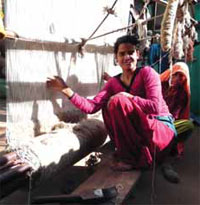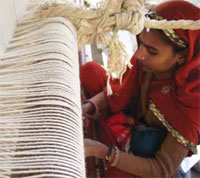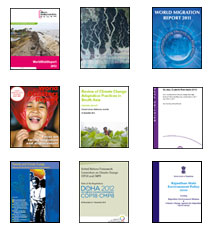

By: Taslima Islam
Why the decline in tigers?
It must be a scam is a thought that usually comes up when
someone is discussing the work of a not-for-profit organization
or a philanthropist. Ethics are questioned, and it is tempting
for one to be skeptical and even cynical of any positive benefits
that may result from corporate social initiatives.
It held quite true during a visit to the small village of Narhet, Rajasthan this December. Jaipur Rugs Foundation (JRF), a not-for-profit organization is working with the women of this artisan village, helping them earn by using the skills they inherited from their ancestors.

Photo: Showvik Das Tamal
An obvious benefit of an
association with JRF was that most
people were making good money by
working from home. JRF offers the
women of the village free training in
the process of weaving rugs, and
also provides them each with a loom,
or an informal community unit to work
at. It also claims to provide health
care, education for women and
children.
Some people who were
unhappy probably, and that is only
my opinion, prefer a less laborious
way of earning money. That is fine,
as long as they make their choice. Because the whole point of
this exercise is to empower them at the end of the day.
The women were usually the happier bunch and shared stories of how they can take care of their kids and earn money while sitting at home. A woman named, Mina Devi, 42, was comfortable with the fact that she doesnʼt need to spend any more time working in the fields, as weaving and working on a handloom is what she likes doing the most. Earlier, the cost of having a handloom to work on held her back. Secondly, she mentioned how she accompanies her husband to the market, to pick and choose what she wants to design, something she wasnʼt allowed to do previously.
Within minutes of speaking to a number of women who were either very happy to earn money or wanted more, most of us prepared to see the conflict. ʻWhy they are not questioning this forced labor?ʼ commented one. ʻThey are probably too impressionable to even know the difference,ʼ commented another. Without even trying very hard, we compartmentalized a bunch of people into a herd and thought they should be questioning the earnings they are making. And why not? Werenʼt they better poor and helpless? The way they are supposed to look most of the time?
Out of the many people that we met in Narhet in relation to rug making, only two families came up and said they are having problems. And the sad part was that everyone focused on those two stories, out of the many good and positive ones that we heard. Notes were quickly scribbled down, and the thought that we have a ʻconflictʼ of interests to report, overshadowed every other positive, rags-to-riches story that we came across.
A married couple, Sita and Rajesh, spoke about how they started off by earning Rs.6,000 with the help of JRF and went on to earn Rs.20,000 by gradually making their own contacts in the handloom market. And with more efforts, and meeting more acquaintances, there is a chance for them to earn more. Vijay Singh, a middle-aged widower was quite pleased with working on the handloom instead of working in the fields, as it paid him more and “made use of his actual skills.” At present, he is not only designing prints in Rajasthan, but his designs also go to other cities and are sold at a high price.

Photo: Subash Karki
It must be added though, that one
needs to question things, but selective
questioning is of no use. We generally
tend to be suspicious of big businesses,
particularly those that profess to
empower communities, or engage in
corporate social responsibility (CSR)
exercises. What one needs to
remember is that while a business may
have to keep its eye on the bottom line,
it may well be possible that the occasional philanthropic CEO
may genuinely want to reach out to the masses. We may be
skeptical of his motives, but we cannot turn a blind eye to the
good that comes out of such social endeavours. Organizations
like JRF may not be doing enough for communities, I feel, but it
is giving a proper leg-up to people who might not have had a
chance to improve their lives otherwise. To ignore this fact would
be a big mistake.



